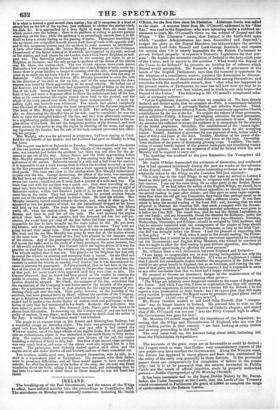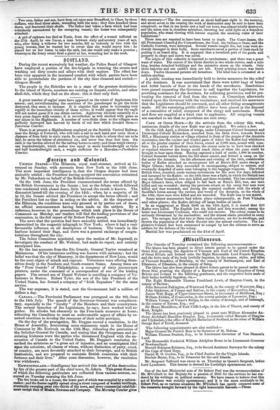IRELAND.
The breaking-up of the Peel Goverment, and the return of the Whigs to office, have infused activity into the proceedings at Conciliation
The attendance on Monday was unusually numerous; including Mr: Smith
O'Brien, for the first time since his liberation. Alderman Gavin was called to the chair. A monster letter from Mr. O'Connell, addressed to his " dear Ray," was read to the Repealers; who were labouring under a subdued ex- citement to learn Mr. O'Connell's views on the subject of Repeal and the Whigs. " The Liberator " states, that Ireland is the battle-field upon which " another Administration has been discomfited and dispersed "; assigns the glory to the Repeal Members, but acknowledges the services rendered by Lord John Russell and Lord George Bentinck; and repeats his opinion that " it is utterly impossible for the British Parliament to govern Ireland properly: it requires a Domestic Legislature for that pur- pose." He depicts the miserable condition of Ireland in the forty-sixth year of the Union; and in answer to the question " What would the Repeal of the Union do for Ireland?" he presents an inviting list of reforms which Repeal would accomplish. He demands a redress of grievances at the hands of the English Parliament ; says that the moment is opportune for the adoption of a conciliatory course; conjures the Association to discoun- tenance the fomenters of dissension and distraction among themselves; and
concludes with the comfortable remark, that " after what has happened in the present session of Parliament, no man can tell how near we may be to the accomplishment of our best wishes, and in truth to our only hope—the Repeal of the Union." The following is Mr. O'Connell's compressed sche- dule of necessary reforms- " Let no Englishman, therefore, ask what we complain of. We have already declared, and declare again, that we complain of—First, A scandalously defective representation. Second, A grievously limited and defective franchise. Third, Miserably defective corporate reform! Fourth, The monstrously oppressive Church •
establishment for the use of the few. We require the redress of these grievances, and in addition—Fifthly, A literary and religious education for each persuasion, free from the power of any other. Justice to all, ascendancy to none. Sixthly, An absentee tax sufficient to secure the residence or to compensate for the absence of the landed proprietors. Seventhly, The establishment of the tenant right.' Eighthly, Compensation for valuable improvements made by the occupying
tenant. Ninthly, Abolition of ejectment for non-payment of rent, unless under a lease of thirty-one years at the least. Tenthly, Abolition of the power of dis- traint, unless there be a lease of twenty-one years at the least. Eleventhly Total abolition of the power of distraining growing crops. Twelfthly, The insti- tution of county boards instead of the present inadequate and blundering county grand jury system. Such are the measures of relief for Ireland which the new Ministry will be required to carry out."
The speaking was confined to the pure Repealers; the Youngsters did not interfere.
Mr. Smith O'Brien deprecated the existence of dissension, and confessed that it had operated injuriously during the past six weeks on the advaece of the Repeal cause. He furnished some interesting evidence as to the part originally taken by the Whigs on the Coercion Bill just rejected-
" It is only due to the Irish Whigs to say that upon my arrival in London I found on their part an earnest disposition to cooperate with us in the most reso- lute manner. I can say the same thing. for no other party in the British House
of Commons. If we had taken the advice of the English Whigs, we should have allowed the bill to be read a first time without opposition; we should have allowed the second reading to pass after debate; and they gave us some vague expecta-
tions that when the bill-got into Committee, they would then perhaps assist us ir; mitigating its clauses. The Protectionists totik a different course. It was their
object to delay the second reading of the Corn Bill; and, knowing that we were prepared to obstruct the Coercion Bill, they made a compact with the Govern- ment that they would support the first reading provided precedence were given to it before the Corn Bi1L The result was, that we had the British Legislature is our own hands; and my honourable friend the Member for Kilkenny, under the direction of his father, our chief, took care that every day—Mondays, Tuesdays, Wednesdays, Thursday; and Fridays—should be occupied by Irish business, and that no measure connected with the management of the empire at large should be brought under discussion in the House of Commons, so long as the Irish Coer- cion Bill was brought before the House. I had the pleasure of supporting him
in that policy. * • * Well, when it came to the second reading, the Protec- tionists found that it would be an exceedingly convenient opportunity for turning out the Government; and English Whig Members, who wanted to convince us that we ought to allow the first reading to pass without opposition, also thought it a convenient opportunity for effecting the same purpose. Mr. O'Brien drew a new distinction between England and Ireland— "I am happy to congratulate you on your having extinguished not only the Coercion Bill' but extinguished the Ministry. If I were an Englishman, I confess
that I should feel considerable doubts whether the resignation of Sir Robert Peel. would be any great benefit to England; but as an Irishman, and viewing the con- duct of that party which he led towards this country, I find it impossible to come to any other conclusion than that we have had a happy deliverance." He seemed to foresee an imminent danger to the maintenance of the Repeal agitation, and repeated a warning often given- " The Whigs are infinitely more dangerous enemies to the cause of Repeal than the Tories. And while I say this, I have no expectation that they will attempt,.
after the recent experience, to introduce a new coercion bill for Ireland; I do not expect a state prosecution at their hands: but I do expect that they will make every exertion to undermine the Repeal cause bypromises of good places and of good measures." (Loud cries of " Never, never!'
Mr. Henry Grattan wished to tell Lord John Russell, that " compro- mise" was no longer known in Ireland. He advised him to vote on the instant a million of money for the erection of Catholic chapels; and stated that if Mr. O'Connell was not put " into the Privy Council high in office," the Government was gone for ever! Mr. Maurice O'Connell magnified the importance of the Repealers; as- serting that the Whigs and Protectionists of England, who are now the only leading parties in that country, " are both looking at every motion and at every proceeding in this hall." The rent came well up, the amount being about 2601., including 501.. from the Philadelphia Sympathizers.
The accounts of the grain crops are as favourable as could be desired ; but I regret much to state, that further very unsatisfactory reports of the new potato crop have reached the Government. Along the Western coast, the disease has appeared in many places, and fears were entertained for the safety of the early crop generally in those districts. In the provincial papers there are comparatively few complaints of failure in the potato crop ; but it is to be presumed that the returns forwarded to Dublin Castle are the result of official inquiries, made by properly authorized persons.—Dublin Correspondent of the Morning Chronicle.
It has been communielted to the Royal Dublin Society by Mr. Penne- father, the Under Secretary at the Castle, that the Lords of the Treasury would recommend to Parliament the grant of 2,0001. to complete the range of conservatories at the Botanic Garden. Two men, father and son, have been set upon near Broadford, in Clare, by three ruffians, who fired three shots, wounding both the men; they then knocked them down, and fractured their skulls. The father had taken a farm which had been voluntarily surrendered by the occupying tenant; the house was subsequently attacked.
A girl of eighteen has, died at Ennis, from the effect of a wound inflicted on - the 27th April, by one Lucas, a man between sixty and seventy years of age, who, after being a widower for two months, fell so violently in love with the young woman, that he wanted her to swear that she would marry him : he placed her on her knees to take the oath, but she would only make a promise ; whereupon the hoary swain fired a pistol at her, wounding her in the neck.



























 Previous page
Previous page